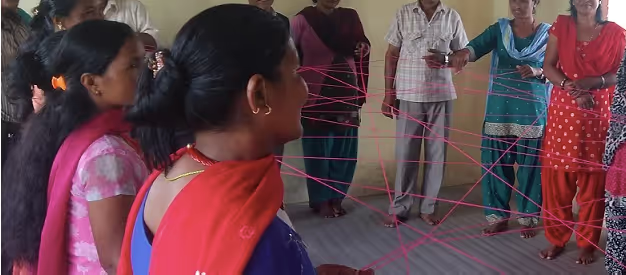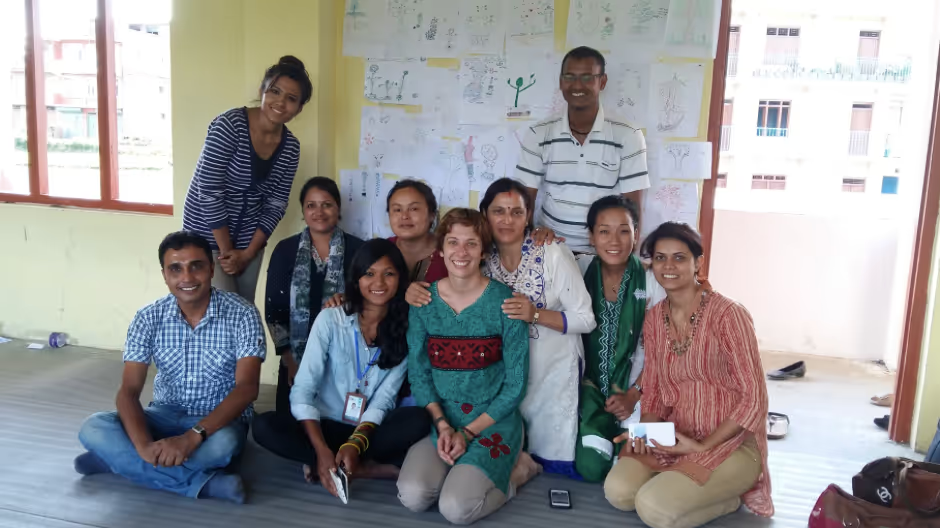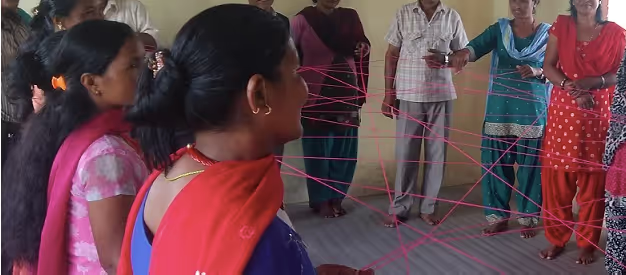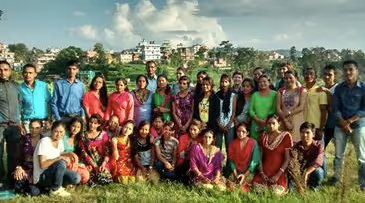Building Resilience among Communities in the Aftermath of the Earthquake in Nepal: Perspectives from the Nepal Clinical Team

In our first project blog we shared the expansion of our intervention research with flood-prone communities in far-Western Nepal to earthquake affected communities in Kathmandu Valley.
In this, our second blog installment for the earthquake intervention project, we share perspectives from the Nepal clinical team: Pratima Katiwada, Pavan Kumar Yadav, Melina Khaiju and Sarita Parajuli. The team contributed to the development of and implemented a 3-day mental health integrated disaster preparedness training for earthquake survivors. This community-level group training/counseling intervention emphasizes psychoeducation about common reactions to disasters, coping skills, disaster preparedness, psychological first aid, community-building exercises, and culturally-specific components - including discussions about disaster attributions and mental health stigma in Nepali culture. The content is manualized, facilitated by Nepali psychosocial staff, and includes exercises (e.g. breathing techniques; grounding), expressive art activities, role-plays, games, and group discussion.

Impressions from the team: survivors’ stories that stay with you:
“…different participants shared their experiences of the day of earthquake, which was very heart-touching…Most of the participants talked about their symptoms related to the mental health which had been seen in them just after the earthquake and later on. For example, continuous fear, bad dreams, trembling, and also they shared about their children, who were suffering.” (Pavan)
“One woman around 60 years old looked sad and nervous while sharing her experience of the earthquake. She felt difficulty to sleep, nightmares came…She didn’t concentrate on her daily activities. She was trembling all the time.” (Pratima)
“At the time of earthquake, [one woman] had newly given birth to her child…when her house collapsed, she and her child were trapped inside the room and there were nobody to rescue her…After a long time, she came out through the window…but she suffered...” (Pavan)
As noted above, it was “heart-touching” and difficult for many of the clinicians to hear such stories. Importantly, many of the clinicians are also earthquake survivors themselves. Given this, the earthquake intervention research project also includes tools, a self-care training and follow up component for mental health service providers. This component was designed to mitigate the impact of vicarious trauma and compassion fatigue among the project team and other providers working with earthquake victims (many of whom are also victims themselves). We have now completed two rounds of this training with 60 earthquake-responders. We are collecting the final outcome data from this last group and will share of our finding in the next project blog (#3).

Feedback from the community about benefit of the training:
The clinical team was very pleased to receive lots of positive feedback about the intervention from the community.
“[A woman] participated in the 3 day training program to increase resilience... She practiced those exercises and her psychosocial health condition has improved. She claim she smokes less and she has not lost her consciousness in recent earthquake aftershocks.” (Melina)
“A month later, at the time of clinical supervision/follow up, [a woman from the training] shared that most of the technique and exercises that had been taught in training was very beneficial for her. Now, she is feeling very light, she is sleeping well. She has been sharing her feeling with her neighbors.” (Pavan)
The clinicians were also pleased to have the opportunity to work on this project:
“By getting opportunity to work with ELRHA and TPO Nepal in such an affected area, I am feeling very proud, and it is also very warm experience to be a part of those earthquakes affected people's pain.” (Pavan)
“I am a nurse by profession and had past experience of working in the mental health and psychosocial field. The opportunity to work in ELRHA project really fulfilled my interest to work in the community setting during post-earthquake scenario….Different stress reduction techniques were used during the training period which enabled [participants] to minimize their stress. They also receive the mental health education that helped them to recognize the trauma related mental health problems…My work experience in this project was exciting, great, and challenging.” (Sarita)

Importance of moving beyond anecdotal evidence to results based on rigorous research methods:
It is encouraging to hear such positive feedback about the benefits of the intervention from communities. It is also rewarding to know that the Nepal clinical team felt strongly about the usefulness of the intervention. However, anecdotal evidence alone does not allow us to determine whether the intervention is efficacious. We are in the process of analysing results from the research (based on a stepwise comparison model in two communities) and will share some preliminary findings in our next blog. Specifically, we are measuring whether the 3-day intervention decreased mental health symptoms and increased disaster preparedness and social cohesion.
Stay updated
Sign up for our newsletter to receive regular updates on resources, news, and insights like this. Don’t miss out on important information that can help you stay informed and engaged.
Related articles


.png)
Explore Elrha
Learn more about our mission, the organisations we support, and the resources we provide to drive research and innovation in humanitarian response.